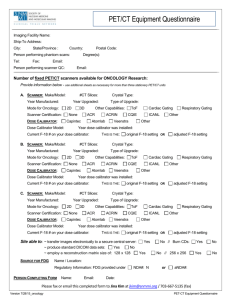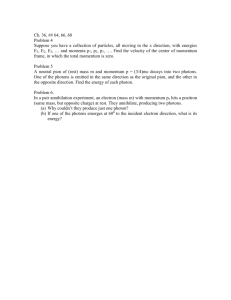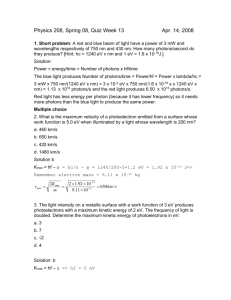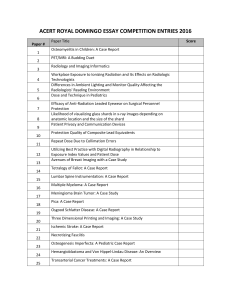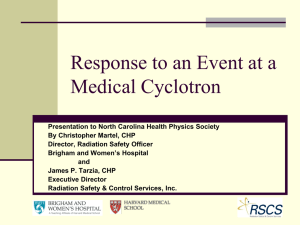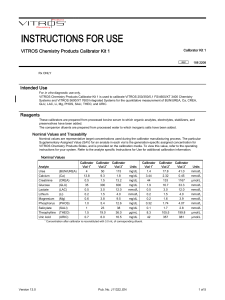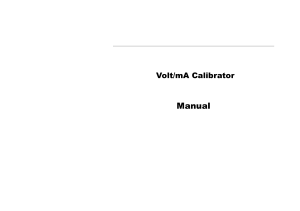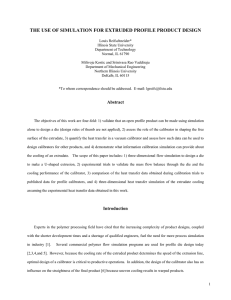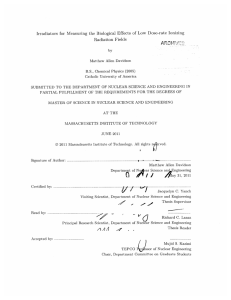Lecture 2 preperation
advertisement
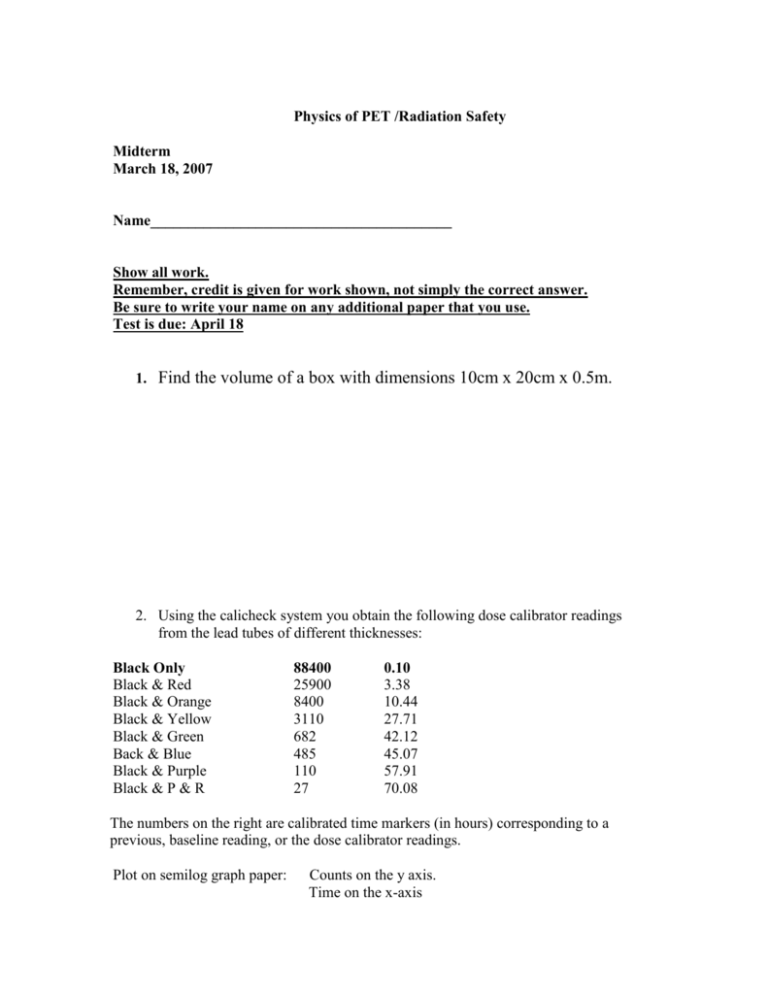
Physics of PET /Radiation Safety Midterm March 18, 2007 Name________________________________________ Show all work. Remember, credit is given for work shown, not simply the correct answer. Be sure to write your name on any additional paper that you use. Test is due: April 18 1. Find the volume of a box with dimensions 10cm x 20cm x 0.5m. 2. Using the calicheck system you obtain the following dose calibrator readings from the lead tubes of different thicknesses: Black Only Black & Red Black & Orange Black & Yellow Black & Green Back & Blue Black & Purple Black & P & R 88400 25900 8400 3110 682 485 110 27 0.10 3.38 10.44 27.71 42.12 45.07 57.91 70.08 The numbers on the right are calibrated time markers (in hours) corresponding to a previous, baseline reading, or the dose calibrator readings. Plot on semilog graph paper: Counts on the y axis. Time on the x-axis Name________________________________________ Then, using the decay equation A = A0 x (exp(-0.693/T1/2 x t)) and the black only values as Ao, determine the predicted counts for each of the times on the right hand side. Does each predicted value agree with the actual value to within +/- 5 % Is the dose calibrator response linear? 3. Carbon-11 is a PET radionuclide used in many research applications. How much C-11 would you have to start with to have 30mCi at the end of 73 minutes? 4 Write the equation which describes exponential absorption and identify the variables 2 Name________________________________________ 5. A bone tumor accumulates 6uCi/gram F-18. Photons must pass through two half value layers before reaching the detector. What percentage reduction in the number of photons reaching the detector is this? 6. A compound of Nitrogen-13, a positron emitter used in some research applications involving protein metabolism, has a 10 minute biological half life, and 10 minute physical half-life.. What is the effective half life? 1/te = 1/tb + 1/tp 7 Find the tenth value layer in lead for 511 keV photons. Linear attenuation coefficient = 0.17325mm-1 3 Name________________________________________ 8. Describe step by step the procedure for safely opening packages of radioactive material 9. Which is the most sensitive type of portable survey meter? 10 O-15 is produced in the cyclotron in your hospital. One Curie is produced, and sent by pneumatic tube to the nuclear medicine department. You receive the dose of O-15 and administer to the patient in a closed breathing system for a study of cerebral blood flow. The time from the production of the O-15 and the beginning of the imaging procedure is 14 minutes. How many Becquerels of activity are available for the patient at that time? T1/2 = 2 minutes 11. How many half value layers will it take to reduce an x-ray beam from a PET-CT unit with intensity 6.3 x 105 photons, to less than 1.0 x 102photons? 4 Name________________________________________ 12. Describe the difference between a RAD and a Roentgen? 13. You receive a vial of 4mls of Fluorine-18 at 8AM. You assay the vial in a dose calibrator, and the assay is 1,200 megaBequerels/ml. You want to give a 20mCi dose at 11:30AM. What volume should you draw into the syringe? 14. At 1.3 meters, you are exposed to a flux of 3.50 x 10**5 photons from a source of F-18. You want to reduce your exposure to 2.5 x 10**4 photons. How far away from the source should you move to reduce your exposure to this amount? 5 Name________________________________________ 15 The exposure rate at 2 feet from a patient containing F-18 is 12mR/min. What will be the exposure rate at 7 feet from the source? 16: Go to this website, review the information provided about pancake and scint survey meters. http://www.uos.harvard.edu/ehs/radsafety/sur_how.shtml Then write a detailed explanation, step by step, describing how they work. 17: Go to this website: http://www.nrc.gov/reading-rm/doc-collections/cfr/part035/ and identify the records that need to be kept in a nuclear medicine department. Bonus questions (10 extra points. Everybody must do it).: 17. A 0.511 Mev photon travels from the center of a PET circular FOV to the detector in 0.5 nanoseconds. What is the diameter of the field of view 6
